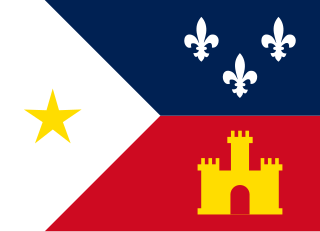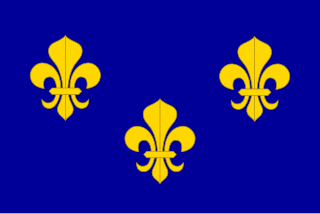
Cajun cuisine is a subset of Louisiana cooking developed by the Cajuns, itself a Louisianan development incorporating elements of Native American, West African, French, and Spanish cuisine.

The Acadians are an ethnic group descended from the French who settled in the New France colony of Acadia during the 17th and 18th centuries.

The Cajuns, also known as Louisiana Acadians, are a Louisiana French ethnicity mainly found in the US state of Louisiana and surrounding Gulf Coast states.
Creole peoples may refer to various ethnic groups around the world. The term's meaning exhibits regional variations, often sparking debate.

Evangeline Parish is a parish located in the U.S. state of Louisiana. As of the 2020 census, the population was 32,350. The parish seat is Ville Platte.
The French language is spoken as a minority language in the United States. Roughly 1.18 million Americans over the age of five reported speaking the language at home in the federal 2020 American Community Survey, making French the seventh most spoken language in the country behind English, Spanish, Chinese, Tagalog, Vietnamese, and Arabic. Several varieties of French evolved in what is now the United States:

Acadiana, also known as Cajun Country, is the official name given to the French Louisiana region that has historically contained much of the state's Francophone population.

The University of Louisiana at Lafayette is a public research university in Lafayette, Louisiana, United States. It has the largest enrollment within the nine-campus University of Louisiana System and the second-largest enrollment in Louisiana, behind only Louisiana State University. It is classified among "R1: Doctoral Universities – Very high research activity".

Justin Elmer Wilson was a Southern American chef and humorist known for his brand of Cajun-inspired cuisine, humor and storytelling.

Louisiana Creoles are a Louisiana French ethnic group descended from the inhabitants of colonial Louisiana before it became a part of the United States during the periods of French and Spanish rule. They share cultural ties such as the traditional use of the French, Spanish, and Creole languages and predominant practice of Catholicism.

The Louisiana Ragin' Cajuns are the athletic teams of the University of Louisiana at Lafayette. The college has been competing athletically since 1901. The Ragin' Cajuns compete in NCAA Division I, fielding 16 varsity teams.
Carl Anthony Brasseaux is an American historian and educator. He specialized in French Colonial North America, particularly of Louisiana and the Cajun people. He helped to pioneer the field of Cajun history, and his published works on this topic represent the first serious, in-depth examination of the history of the ethnic group.

Glenn Russell Conrad was an American historian, professor, and author. He is known for his research of south Louisiana culture, as well as an expert on archival studies, nineteenth-century European history, and the history of colonial Louisiana. He taught at Southern Arkansas University, Magnolia and the University of Southwestern Louisiana from 1958 until 2003, and serving as the director of the Center of Louisiana Studies at University of Southern Louisiana from 1973 until 2003.

The flag of Acadiana represents the Acadian (Cajun) ethnic region of southern Louisiana. It consists of two equal horizontal bands of blue (top) and red (bottom) bearing three white fleurs de lis and a gold castle, respectively, and a white isosceles triangle at the hoist, within which is a gold five-pointed star. It was designed in 1965 and officially adopted July 5, 1974. The flag is referred to as the Acadiana flag or Cajun flag.

Attakapas Parish, a former parish (county) in southern Louisiana, was one of the twelve parishes in the Territory of Orleans, newly defined by the United States federal government following its Louisiana Purchase in 1803. At its core was the Poste des Attakapas trading post, which developed as the current city of St. Martinville.
John Laudun is a folklorist, essayist, and professor at University of Louisiana at Lafayette.

The Sabine Shoe is the name of the bronze shoe trophy that was awarded to the winner of the annual college football game between the Louisiana Ragin' Cajuns of the University of Louisiana at Lafayette in Lafayette, Louisiana and the Lamar Cardinals of Lamar University in Beaumont, Texas. The Sabine Shoe trophy was first awarded in 1968 by the University of Southwestern Louisiana's chapter of Alpha Phi Omega fraternity. The name of the bronze rivalry trophy was derived from the Sabine River that forms part of the Texas–Louisiana border. USL defeated Lamar in the 1978 edition of the rivalry game, but the Ragin' Cajuns were not awarded the trophy as it had vanished. The Sabine Shoe trophy now sits in at trophy case in the Ragin' Cajun Athletic Complex in Lafayette.
The Louisiana Ragin' Cajuns football program is a college football team that represents the University of Louisiana at Lafayette at the NCAA Division I Football Bowl Subdivision (FBS) level as a member of the Sun Belt Conference. Since 1971, the team has played its home games at Cajun Field in Lafayette, Louisiana. Michael Desormeaux has served as Louisiana's head coach since 2021.
Jean Duet "Dewey" Segura was an American folk musician. He and his brother Edier Segura formed the duo known as the "Segura Brothers". The duo created some of the earliest commercially recorded Cajun music in the late 1920s.

Louisiana French is an umbrella term for the dialects and varieties of the French language spoken traditionally by French Louisianians in colonial Lower Louisiana. As of today Louisiana French is primarily used in the state of Louisiana, specifically in its southern parishes.













